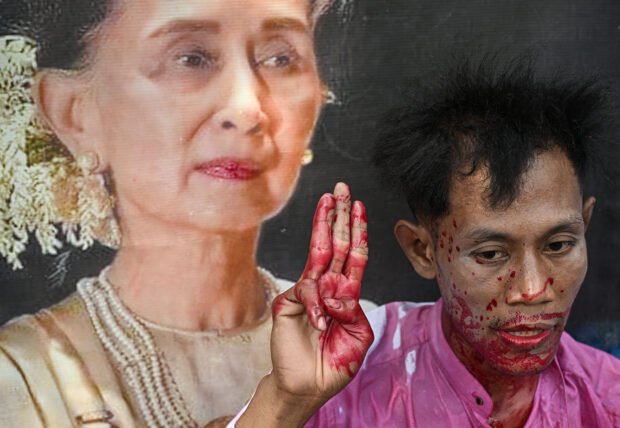
A protester covered in fake blood flashes the three-finger salute next to an image of detained civilian leader Aung San Suu Kyi during a demonstration outside the UN office in Bangkok on February 1, 2024, to mark the third anniversary of the coup in Myanmar. AFP
YANGON — Myanmar on Thursday entered its fourth year since a coup ended a short-lived dance with democracy, with the embattled junta warning it will do “whatever it takes” to crush opposition to its rule.
The junta extended a state of emergency by six months on the eve of the anniversary, once again delaying promised elections as it struggles to quash growing resistance to its rule.
Streets in commercial hub Yangon were quieter than usual on Thursday morning, AFP reporters said, as opponents of the military called for people to stay indoors in a “silent strike” against the coup.
Buses usually packed for the morning rush hour were almost empty and at one market vendors were packing up their stalls and heading home early.
READ: Myanmar resistance forces outline terms for eventual handover of power
“I won’t go out between 10am and 4pm today,” one office worker in Yangon told AFP, referring to the times of the “silent strike.”
“I feel satisfied to see there are not many people out in the streets,” she said, requesting anonymity for security reasons.
“It is the proof of our unity against the coup.”
In the northern jade and ruby mining hub of Mogok, the scene of recent fighting, the streets were almost deserted.
“Some residents left to other towns lately because of fighting. People are scared but still want to show solidarity,” a resident said.
Bloody quagmire
UN Secretary-General Antonio Guterres called Thursday for an end to violence in Myanmar and a return to democracy on the “sombre anniversary” of the putsch, while on Wednesday the United States announced a fresh round of sanctions.
In the early hours of February 1, 2021, security forces rounded up Nobel laureate Aung San Suu Kyi and lawmakers from her National League for Democracy (NLD) party as they prepared to take their seats in parliament.
The military claimed widespread fraud had taken place during polls weeks before, when the NLD had trounced a military-backed rival in a vote observers had concluded was largely free and fair.
Across the country, huge marches against the coup were met by a brutal and sustained crackdown that sent thousands of protesters seeking ways to fight back.
More than 4,400 people have been killed in the military’s crackdown on dissent and over 25,000 arrested, according to a local monitoring group.
Open dissent on the streets of major urban centres has been all but stamped out by the junta’s bullets, batons and networks of undercover police and informants.
But across swathes of the country, the military is struggling to crush resistance to its rule.
Anti-coup “People’s Defense Forces” that sprang up in the wake of the crackdown have surprised the military with their effectiveness, analysts say, and have dragged its troops into a bloody quagmire.
And in late October, an alliance of ethnic minority fighters launched a surprise offensive in northern Shan state, capturing swathes of territory and taking control of lucrative trade routes to China.
Clashes and reprisals have ravaged swathes of Myanmar and forced more than two million people to flee their homes, according to the UN.
A Beijing-brokered peace deal has paused the fighting in the north, but the alliance has largely kept its recent gains and clashes continue elsewhere.
The cascade of setbacks has dented morale among low- and mid-level officers, according to several military sources contacted by AFP, all of whom requested anonymity.
On Wednesday, junta chief Min Aung Hlaing said the military would do “whatever it takes” to crush opposition to its rule.
Due to expire at midnight Wednesday, the state of emergency was kept in place to “continue the process of combatting terrorists”, the junta said in a statement.
In a joint statement Wednesday the foreign ministers of Australia, Canada, New Zealand, Norway, South Korea, Switzerland, the UK and the US, and the EU’s foreign policy chief, called for the military to release political prisoners and halt violence against civilians.
‘Freefall’
The human rights situation in Myanmar is in “freefall,” the United Nations rights chief said this week.
Junta groups have torched villages, carried out extrajudicial killings and used air strikes and artillery bombardments to punish communities opposed to its rule, opponents and rights groups say.
The junta has targeted media deemed critical of the coup and subsequent crackdown, revoking licenses and arresting and jailing dozens of journalists.
With 43 journalists languishing behind bars last year, Myanmar was the world’s second-worst jailer of journalists in 2023, according to the Committee to Protect Journalists, behind only China.
Diplomatic efforts to end the conflict led by the United Nations and the Association of Southeast Asian Nations regional bloc have made no headway.